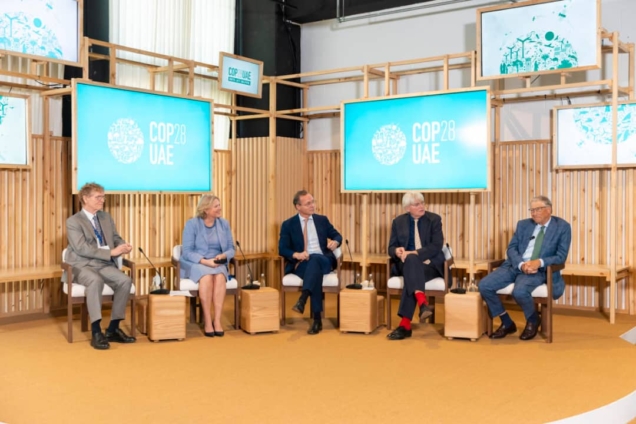A groundbreaking initiative, named AIM4Scale, aimed at supporting the advancement of resilient and low-emission food system innovations and facilitating their transition to a larger scale, has been introduced at COP28.
The announcement of this new mechanism saw the participation of Michael Kremer, the 2019 Nobel laureate in economics, along with Her Excellency Mariam Almheiri, UAE Minister of Climate Change and Environment, and Bill Gates, Co-chair of the Bill & Melinda Gates Foundation.
The Innovation Commission for Agriculture, Food Security, and Climate Change, led by Professor Kremer, is teaming up with the COP28 Presidency to influence the structure of AIM4Scale.
This collaboration includes guiding the selection of innovations backed by robust evidence of their impact and cost-effectiveness, as well as crafting specific, actionable plans to propel these innovations to a broader scale.
Professor Kremer emphasized the global significance of innovation as a public good during an event jointly hosted by the COP28 Presidency and the Bill & Melinda Gates Foundation at COP28.
Professor Kremer highlighted the significance of adapting innovations, refining them through A/B tests, and subsequently scaling them as a means to establish proof of concept and generate global knowledge.
He emphasized the pivotal role of global funding in the development and scaling of innovations, underlining its importance in driving international progress.
“Adapting innovations, refining them through A/B tests, and scaling them provide proof of concept and generates global knowledge that can inform scaling internationally. This means that global funding has an important role to play to develop and scale innovations.”
At the event, Kremer unveiled recommendations for advancing an initial selection of key innovations towards broader implementation and expediting the progress of innovations in their early stages. One of the recommendations said enhanced weather predictions have the potential to provide significantly more precise and timely weather and seasonal forecasts.
There is compelling evidence indicating that farmers adjust their agricultural practices based on accurate forecasts.
Securing regional forecasts for 12 countries with 260-305 million farming families exposed to the Asian monsoon and similar weather systems in Africa is projected to incur a cost of USD 23 million. However, the benefits for farmers are anticipated to exceed this investment by more than a hundred times.
Climate change extends its impact beyond weather, influencing factors such as pests, soil salinity, agricultural markets, and the optimal selection of seeds and other inputs.
The advancement of digital agriculture, expected to expedite the progress of early-stage innovations, offers a means for timely, cost-effective, and potentially tailored delivery of information to enhance farmers' resilience.
Several governments have initiated digital agricultural advisory programs, often collaborating with technical partners to apply human-centered design principles and A/B testing to enhance communication with farmers. India, for instance, has successfully implemented large-scale programs.
The rapid scaling of digital agriculture holds the potential to reach hundreds of millions of farmers.
Further recommendations underscored the importance of training in rainwater harvesting. The guidance emphasized that on-farm rainwater harvesting has the potential to enhance soil quality, increase yields and revenues, and sequester carbon.
Implementing straightforward training sessions can elevate the adoption of harvesting techniques like demi-lunes. Allocating a funding of USD 21 million to scale up such training could positively impact approximately 1.8 million farmers in Burkina Faso, Mali, and Chad, resulting in benefits up to six times greater than the costs.
Another aspect highlighted the significance of microbial fertilizers as an early-stage innovation. These fertilizers leverage bacteria to enhance crops' absorption of nutrients, thereby improving yields and reducing the dependence on synthetic fertilizers. Positioned as an innovation with considerable potential to enhance food security while mitigating emissions, modest funding could facilitate the testing and adaptation of microbial fertilizers in Low- and Middle-Income Countries (LMICs).
Creating a fund designed to invite proposals for the development, testing, and adaptation of innovations related to climate change, food security, and agriculture could play a pivotal role in promoting the adoption of microbial fertilizers among smallholder farmers in Low- and Middle-Income Countries (LMICs). This initiative aims to support the generation of cost-effective innovations with the potential to make a meaningful impact.
The Commission comprises former heads of state and finance ministers, along with leaders in international organizations and civil society, demonstrating a comprehensive and diverse approach to addressing challenges in climate change, food security, and agriculture.
Latest Stories
-
Gov’t has failed its commitment to IPPs – Ablakwa
1 min -
Sell Chrome to end search monopoly, Google told
13 mins -
KATH to install seven new dialysis machines by end of November
16 mins -
Walewale: Police confiscate 37 bags of cocoa beans suspected of being smuggled out of Ghana
27 mins -
‘Expired’ Rice Scandal: FDA confirms rice was safe for consumption after rigorous lab tests
33 mins -
Many women have experienced intimate partner violence – Angela Dwamena Aboagye
53 mins -
Power challenges persist due to government’s mismanagement of revenues – Okudzeto Ablakwa
2 hours -
Jordan Ayew injury not as bad as feared – Leicester City boss
2 hours -
Stonebwoy heads to North America for UP & RUNNIN6 tour
2 hours -
FDA explains extension of best-before date for ‘expired’ rice
2 hours -
Rebecca Akufo-Addo, Mahama storm Akuapem North as NPP NDC slugs it out
2 hours -
Fatawu’s injury a big blow for us – Leicester City manager
2 hours -
No MC has influenced pop culture in 2024 more than me – Portfolio
2 hours -
Kpando NCCE holds dialogue for Parliamentary Candidates
2 hours -
Bawumia solicits support of CSOs to tackle ‘entrenched interests’ in corruption fight
2 hours

